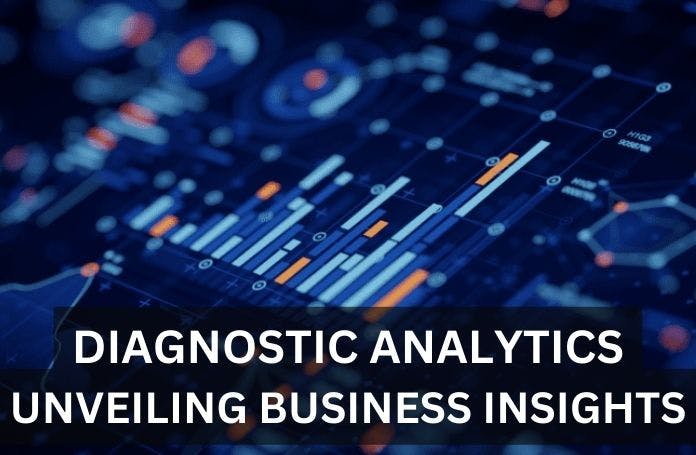Diagnostic Analytics: Unveiling Business Insights

Introduction
In the ever-evolving landscape of data analysis, Diagnostic Analytics emerges as a beacon of informed decision-making. This article delves into its intricacies, exploring its components, significance, and real-world impact. Let's embark on a journey through the data-driven realm.
Understanding Diagnostic Analytics
Diagnostic Analytics, a subset of business intelligence, involves analyzing historical data to understand what happened and why. It goes beyond mere reporting, providing deep insights into the factors influencing past outcomes. This method is instrumental in identifying patterns and trends critical for strategic decision-making.
Significance in Business
The significance of Diagnostic Analytics cannot be overstated in the business world. It acts as a compass, guiding organizations through the labyrinth of data, helping them comprehend past performance, rectify issues, and optimize strategies for the future.
Key Components
To master Diagnostic Analytics, one must grasp its key components: data collection, data cleansing, data analysis, and interpretation. Each step is crucial for deriving accurate insights, ensuring the integrity of the analytical process.
Benefits for Decision-Making
One of the primary advantages lies in its ability to enhance decision-making. By understanding historical data patterns, businesses can make informed choices, minimizing risks and maximizing opportunities. Diagnostic Analytics empowers leaders to learn from the past, paving the way for a more robust future.
Implementation Challenges
While Diagnostic Analytics offers a plethora of benefits, implementing it comes with its own set of challenges. From data integration issues to the need for skilled professionals, overcoming these hurdles is essential for unlocking its full potential.
Real-world Applications
The real-world applications of Diagnostic Analytics span various industries. From healthcare optimizing patient care based on historical data to retail refining marketing strategies, its impact is transformative.
Role in Predictive Analysis
Diagnostic Analytics serves as the foundation for predictive analysis. By understanding historical trends, organizations can build models to foresee potential future outcomes, enabling proactive decision-making.
Leveraging Machine Learning
The synergy between Diagnostic Analytics and machine learning is a game-changer. Machine learning algorithms enhance the analytical process, providing more accurate predictions and deeper insights.
Industry-specific Insights
Different industries harness Diagnostic Analytics uniquely. Whether it's finance identifying fraudulent activities or manufacturing optimizing production processes, its adaptability makes it indispensable.
Emerging Trends
Staying ahead requires an understanding of emerging trends. In the realm of Diagnostic Analytics, advancements like prescriptive analytics and augmented analytics are shaping the future landscape.
Ensuring Data Security
As data becomes the lifeblood of businesses, ensuring its security is paramount. Diagnostic Analytics necessitates robust measures to protect sensitive information, maintaining trust and integrity.
Diagnostic Analytics FAQs:
How does Diagnostic Analytics differ from Predictive Analytics? Diagnostic Analytics focuses on analyzing historical data to understand past events and reasons, while Predictive Analytics forecasts future outcomes based on patterns.
What challenges can organizations face in implementing Diagnostic Analytics? Implementation challenges may include data integration issues, lack of skilled professionals, and resistance to change within the organization.
Is Diagnostic Analytics only applicable to large enterprises? No, Diagnostic Analytics is adaptable to businesses of all sizes. Small and medium enterprises can benefit by understanding their historical data for strategic decision-making.
Can Diagnostic Analytics be applied in healthcare for patient care improvement? Absolutely, Diagnostic Analytics plays a vital role in healthcare by analyzing patient data to optimize care processes and improve overall patient outcomes.
How does Diagnostic Analytics contribute to data-driven decision-making? By providing insights into historical data patterns, Diagnostic Analytics empowers organizations to make informed, data-driven decisions, minimizing uncertainties.
Are there any ethical considerations in the use of Diagnostic Analytics? Ethical considerations revolve around data privacy and security. Organizations must ensure that Diagnostic Analytics is conducted ethically, respecting user privacy and legal regulations.
Conclusion
In the dynamic landscape of data analytics, Diagnostic Analytics stands out as a beacon, illuminating the path to informed decision-making. Its significance, coupled with continuous advancements, positions it as a cornerstone for businesses striving to thrive in an increasingly data-centric world.
If you're motivated to learn more about social data expertise, have a look at the Best data analytics course in Noida, Patna, Jaipur, Lucknow, etc. This educational project not only provides access to information, but also acts as a compass, assisting marketers in utilizing social media analytics skillfully and morally, so influencing the development of responsible and influential insights in the future.